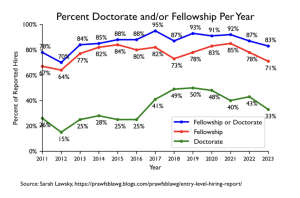
Back in 2007, Richard Posner published a very interesting reflection on the state of the legal academy in the form of the trend is even more pronounced at the “elite” schools. At my own institution, UC Berkeley Law, having a Ph.D. is effectively now the norm for entry-level hires. It’s certainly not required. But a majority of entry-level hires have one.
Doctorates, or their absence, isn’t a perfect proxy for the dynamic Posner describes. But it’s in the ballpark. And the trend toward even more Ph.Ds suggests that, on the whole, the trend Posner noted has accelerated.
That’s one part of the picture. But there’s another set of developments that cuts the opposite way.
In the last fifteen years, many law schools have made significant improvements in expanding programs that are beyond the scholarship-line tenure-track professors, as well as breaking down barriers that used to divide the different parts of the faculty. Many schools have expanded clinics, hiring new faculty to teach clinics who are outstanding practitioners as well as academics. They have expanded legal writing programs, bringing in excellent lawyers as professors of legal writing. Some schools have added “professors from practice”, leading senior practitioners who join the faculty to teach classes and participate in the life of the law school but are not on the tenure track.
This is a big generalization, and I hope I’m not too far off in this description. Describing a diverse area like legal academia reminds me of the parable of the blind men and the elephant. You never know if what you experience is just one part of the elephant. (If you think I’m off, please let me know in the comment threads.) But my sense is that these changes have had a significant impact on the kinds of faculty that a law student might encounter. When I was in law school, three decades ago, it was common to go through three years pretty much only encountering the regular podium scholarship faculty. But my sense is that’s rare today, if not entirely unheard of. Today’s law students are going to be taught by legal writing professors, clinical professors, professors from practice, and of course adjunct professors. All of them are likely to be excellent lawyers steeped in lawyering.
In short, I think there have been two changes since Posner’s critique that cut in somewhat opposite directions. On one hand, the trend Posner saw has accelerated, with more Ph.Ds. than before. On the other hand, schools have made very helpful and important strides towards recognizing the critical role of faculty beyond the podium tenure track.







